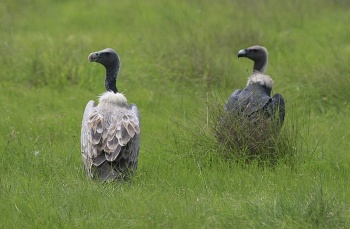(third picture added, obc link deleted, picture date added) |
m |
||
| Line 14: | Line 14: | ||
Sexes similar. Juveniles have a pale downy neck and head and diffuse streaks on pale underparts (much paler than in [[White-rumped Vulture]]) | Sexes similar. Juveniles have a pale downy neck and head and diffuse streaks on pale underparts (much paler than in [[White-rumped Vulture]]) | ||
====Similar species==== | ====Similar species==== | ||
| − | |||
Paler, tawnier and more powerfully built than [[Slender-billed Vulture]] or [[White-backed Vulture]]. Smaller and less tawny than [[Eurasian Griffon]] or [[Himalayan Griffon]], often lacks rufous colouration of [[Eurasian Griffon]]. | Paler, tawnier and more powerfully built than [[Slender-billed Vulture]] or [[White-backed Vulture]]. Smaller and less tawny than [[Eurasian Griffon]] or [[Himalayan Griffon]], often lacks rufous colouration of [[Eurasian Griffon]]. | ||
==Distribution== | ==Distribution== | ||
| + | [[Image:LBV White-rumped Vulture.jpg|thumb|350px|right|left: Indian Vulture, right: White-backed Vulture<br />Compare bill colour and colour of back<br />Photo by {{user|Jugal+Tiwari|Jugal Tiwari}}<br/>Kutch, Gujarat, [[India]], August 2010]] | ||
Formerly widespread in the [[India]]n Subcontinent, from southeast [[Pakistan]] over much of [[India]]. Now rare and local. Range poorly documented owing to widespread confusion with Slender-billed Vulture. One record from [[Afghanistan]] doubtful.<br /> | Formerly widespread in the [[India]]n Subcontinent, from southeast [[Pakistan]] over much of [[India]]. Now rare and local. Range poorly documented owing to widespread confusion with Slender-billed Vulture. One record from [[Afghanistan]] doubtful.<br /> | ||
Resident with some dispersal of young birds. | Resident with some dispersal of young birds. | ||
Revision as of 22:41, 24 November 2011
- Gyps indicus
Identification
Length: 80-100 cm (31.5-39 in); weight: 5.5-6.3 kg (12-13.8 lbs); wingspan 205-229 cm (6.75-7.5 ft). A medium-sized vulture.
- Combination of dark-skinned head, neck and crop with golden-buffy body diagnostic
- Head and long bare neck are grey-brown and sparsely covered with white down, with a buff ruff at the base
- Eyes brown
- Ceres dull grey-green
- Pale yellowish bill
- Dark grey legs
- Whitish lower belly and undertail-coverts
- Light brown under-wing coverts (see flight shot)
Sexes similar. Juveniles have a pale downy neck and head and diffuse streaks on pale underparts (much paler than in White-rumped Vulture)
Similar species
Paler, tawnier and more powerfully built than Slender-billed Vulture or White-backed Vulture. Smaller and less tawny than Eurasian Griffon or Himalayan Griffon, often lacks rufous colouration of Eurasian Griffon.
Distribution

Compare bill colour and colour of back
Photo by Jugal Tiwari
Kutch, Gujarat, India, August 2010
Formerly widespread in the Indian Subcontinent, from southeast Pakistan over much of India. Now rare and local. Range poorly documented owing to widespread confusion with Slender-billed Vulture. One record from Afghanistan doubtful.
Resident with some dispersal of young birds.
Taxonomy
This is a monotypic species.
Slender-billed Vulture was formerly considered conspecific, the species then named Long-billed Vulture.
Habitat
Occurs in semi-desert, forested hills, open areas and around human habitation.
Behaviour
Spends much of the day soaring on thermals, looking for food.
The diet consists of carrion, usually putrid, but sometimes fresh. In some parts of their range, it is customary for human corpses to be placed in high places, for Vultures to feed on - this practise is deeply rooted in religious and cultural traditions.
Nests colonially on cliff ledges or in ruins. Locally in Rajasthan also in trees.
Conservation Status
This species is becoming extremely rare. The rapid decline is thought to be due to the non-steroidal anti-inflammatory drug Diclofenac, which is used in southern Asia as a livestock treatment. It is extremely toxic to vultures when they feed on the carcasses of treated cattle. The drug causes fatal kidney failure. Populations of the white-rumped vulture and slender-billed vulture have also declined by more than 90 percent in the years from 1992 and 2000. On the basis of their catastrophic declines, the IUCN-World Conservation Union has listed these species as critically endangered: the highest level of threat.
The February 2007 issue of the Smithsonian Magazine has an article on the problem and what conservationists are doing about it: [1]
References
- Clements, JF. 2011. The Clements Checklist of Birds of the World. 6th ed., with updates to August 2011. Ithaca: Cornell Univ. Press. ISBN 978-0801445019. Spreadsheet available at http://www.birds.cornell.edu/clementschecklist/downloadable-clements-checklist
- Rasmussen, PC and JC Anderton. 2005. Birds of South Asia: The Ripley Guide. Barcelona: Lynx Edicions. ISBN 978-8487334672
Recommended Citation
- BirdForum Opus contributors. (2024) Indian Vulture. In: BirdForum, the forum for wild birds and birding. Retrieved 26 April 2024 from https://www.birdforum.net/opus/Indian_Vulture





